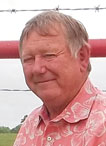
Wayne and Annie Anstine of Mulberry, Ark., have spent their lives trying to find a balance between their economic needs and farming. In 1981, the couple purchased an unused army barracks from Fort Chaffee for $800 but paid $1,200 to have the building moved to their new 160 acres in Mulberry. The home has undergone numerous additions growing into a beautiful, rustic style home and the homestead for two children and eight grandchildren.
Wayne’s father was a pastor at a local church, and the couple met when Annie and her mother came to visit a church service. Even though the teenagers lived only 7 miles apart, they went to different school districts with Wayne going to Mulberry and Annie to Mountainburg. Their first date was to Wayne’s prom which took place only after Wayne asked Annie’s father for permission to take her. Annie’s father knew Wayne was coming and made a point of cleaning a gun when the young man arrived. The gun did not deter Wayne, and they became a couple.
Wayne and Annie have always been a town and country family with one or the other of them having an off-the-farm job. In describing the many transitions of their farming life Wayne said, “I could always see the light at the end of the tunnel but no one told me about the train behind it.” Wayne works for the U.S. Forest Service Cass Job Corps as a water and wastewater treatment plant operator while Annie is attending Arkansas Tech for nursing.
The one constant throughout their years has been raising hogs, and Wayne currently serves as the Swine Superintendent of the Crawford County Fair. When their children were young and showing, the couple raised both Hampshire and Duroc hogs. Now they raise a heritage breed of pasture hogs called Large Black and just had their first litter. Wayne said, “I really love the breed because they are so docile and have marbled meat.” The couple learned about the breed from the Kerr Center in Oklahoma and look forward to adding Large Black to their self-raised meat supply.
The couple started out with a commercial beef herd and wanted to move toward a registered herd of Belted Galloway. However, the price of the registered animals became too costly. Annie said, “We simply could not make a living so we went to dairy.” Annie and Wayne had dairy cattle for six years when their dairy barn burned to the ground. Rather than rebuilding, they transitioned to chickens for five years. When the chicken income was insufficient and needed a new action plan, they went to the experimental station in Booneville, Ark., and learned about Katahdin sheep with a natural but not complete resistance to worms. They decided to raise the sheep because the meat tasted good and the sheep helped maximize land-use. The Anstines have two milking Jersey cows which supply both milk and meat with their Jersey bull calves becoming part of their personal meat supply. Annie said, “The meat is so succulent, it just melts in your mouth.” According to Wayne, the 21 sheep eat what the cattle will not, and the Large Black serve as “nature’s bulldozer.”
Wayne said, “Our current goal is to be self-sustaining in terms of food and to make a little money on the side.” Arkansas recently increased legal raw milk sales to 500 gallons per month, and the Anstine’s plan on selling their excess milk. They also supplement their livestock with chickens for eggs. Annie said, “At the beginning of summer we had 10 laying hens but are now down to three. Our grandson shot a raccoon which we think was the culprit, and we have closed off the top of the pen to prevent further problems.” New hens will soon be purchased.
On the produce side, Wayne and Annie have a substantial garden for canning and freezing including blackberries which should be ready for harvest next year. Every year they go to Baker Seed Company in Mansfield, Mo., to obtain heirloom seeds. Wayne said, “It’s a great place in the middle of nowhere. The owner may be barefoot and in overalls, but he has a vast store of knowledge and hard-to-find seeds.”
The Anstine operation also includes hay, 30 acres of their own land and 60 acres they custom cut for a neighbor. They use wood on their heavily timbered land for building and heat while occasionally selling to locals.
Wayne concluded, “The farm is home and where my heart is and always will be.”







